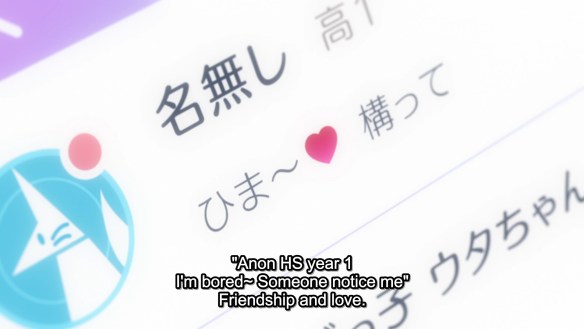Hello folks, and welcome back to Wrong Every Time. Today we’re diving back into Blue Reflection Ray, which most recently offered us the stinger of our delinquent Momo straight-up joining the rest of the cast’s high school class. Apparently no longer content to drive her motorcycle around looking cool all day, Momo has rejoined productive society, which will presumably give her far more chances to bond with Ruka, Hiori, and Miyako. Our team in general are starting to grow far closer; though Momo and Hiori are extremely different people, their contrasts are proving a fine basis for communication, a process facilitated through Miyako’s charmingly annoying provocations.
Aside from that, our recent drama has hewed to a reliable magical girl template, offering episodic dilemmas centered on the team’s schoolmates much in the manner of Sailor Moon or Ojamajo Doremi. Such conveniently resolved challenges are a natural complement to this “getting to know you” phase of the narrative, and if I were to guess, I’d hazard that we’re in for another side drama intended to push forward Momo and Miyako’s relationship. That’s perfectly fine by me; both of them are endearingly messy characters, with Miyako in particular proving the show’s standout so far. Let’s see how our team is evolving as we return to Blue Reflection Ray!
Episode 5
We open on scrolling across alternately lonely and bored social media messages, as one of our villains states that “friendship and love. Those are nothing more than fantasies. There’s only one thing you can believe in in this world…”
And then she gets blocked. Oh no, is this girl an internet troll? Funny how our indicators of social maladjustment shift with the times
It’s funny, when I was growing up, people who saw online interactions as an open call for abuse frequently defended themselves with “it’s the internet, it’s not real.” Now that the internet is everything, and so much of youth socialization occurs across online channels, I assume there’s no longer any question of the internet’s “reality.” Instead we’ve just shifted back to the older justifications for bullying – “they need to grow a thicker skin,” “they were clearly asking for it,” all the classic ways those who wish to deny responsibility for cruelty tend to rationalize their behavior
The troll Uta is unrepentant in the face of Nina’s scolding
“What’s the fun in getting along?” There is a compulsion inside many of us that drives us to be irritants, to spark conflict just because we find conflict enjoyable. Learning to moderate this instinct based on the desires of your company is a natural part of maturation, but many folks just decide not to do that, seeing in those who’d prefer harmony not a valid, respect-worthy alternative perspective, but merely a soft target
We learn of a chatroom centered around “Princess Yuki,” a girl who claims to use her spells for those in need. Presumably this will be our episodic focus character
Momo has elected to bribe her way into the group’s good graces with home cooking. A fine strategy
Momo states she’ll still be living off-campus, as she feels a connection to her absent grandmother at her old place
Miyako apparently stayed up all night pondering reflector business. Charming beat as Hiori fawns over her – given her home life, Miyako’s clearly not accustomed to this sort of concern, and can only handle it by getting defensive
Miyako draws their attention to Ho-Kago, a social media app for high school girls. It’s funny to return to this production after gorging myself on Sailor Moon, and thus better appreciate how these episodic conflicts echo its style. We’ve switched pop-up shops for phone apps, but “a hostile invader disguising itself in the form of our youth culture passions” is apparently a perennial beat
Also makes me kinda sad; these sorts of stories used to be predicated on walking around in the real world, now it’s all phone apps. Our daily lives are far less interesting in the online age, and I’m certainly not immune myself
Miyako describes the “magic spells” of Princess Yuki, which apparently make their targets’ troubles disappear. Excellent investigative work!
Unfortunately, her companions are still too dim to connect this to the enemy Reflectors. I am sorry your allies are idiots, Miyako
Honestly, it’s a pretty brilliant ploy. Young folks are dangerously eager to reveal problems in their personal lives to online strangers, so an advice channel being used to recruit potential targets for Fragment-stealing seems like a great idea
It’s an interesting twist from the last episode, where the need for open communication was the hurdle faced by our tennis players. Sincerity is crucial, but it’s just as important to choose where exactly you place your trust, and an anonymous online forum is not the safest venue for spilling your guts. Every era has its own hazards of youth, and I suppose every era also needs its own magical girls ready to challenge those who’d exploit those hazards
Meanwhile, our villains are being all gloomy and prophetic in a church, as you do
The girls head out on a fact-finding mission to learn more about Princess Yuki
“Is everyone really okay talking about themselves like that?” As with her initial suspicion of the very concept of a phone app, Momo is similarly perplexed by the younger girls’ willingness to bear their heart on the internet. She possesses an older generation’s healthy suspicion of online spaces
“I think the fact that someone’s always there and you can connect is why it’s appealing.” In contrast, Miyako naturally sympathizes with these girls – given her home life, she can appreciate the existence of these social platforms where there is no cost of entry, where your problems will at least be taken seriously by someone, even if you don’t know who that someone is
It’s an argument that can’t easily be resolved, particularly as our increasingly atomized society pushes more and more of our social lives online. Those who are isolated in real life will naturally gravitate towards online socialization, but the public nature and permanence of online socialization, alongside the greater tides of discourse and the often fanatical followings of larger accounts, means there is always a risk of sincere expression being used against you. Humans quite simply weren’t designed to socialize on this scale; we were built for local communities, not accidentally finding ourselves expressing our shower thoughts to millions
But never mind all that, Hiori bought them adorable animal-faced ice cream cones
Hiori and Ruka finally meet a girl who knew a recipient of Princess Yuki’s spell. An implicit tragedy in all of this, that these girls are so consumed by loneliness and despair they’d ask a stranger to take away their emotions entirely
Momo seems to believe the memory resonance of Hiori and Ruka is related to the fate of Hiori’s sister
“My Grams’ secret recipe.” Momo’s relationship with her grandmother also ties her to the past, to the old, unmediated methods of growing close
“A part of me keeps hoping that my mom will contact me and ask me to come home.” Very human anxieties from Miyako. We can declare we’re taking bold steps forward all we want, but merely declaring it and genuinely feeling confident in such a transformation are two very different things
Because of this, even she was briefly tempted by Princess Yuki’s offer, and thus can sympathize entirely with her victims
Suddenly, Princess Yuki’s feed is absolutely overwhelmed with abuse. This is how it goes – we might be able to disregard a mean comment or two, but when the spigot is opened and you are defined as an acceptable target, the abuse is constant and overwhelming. This is how individual actors merge into the horror of the internet – it’s never “just one comment,” it’s contributing to a flood of hatred that no one is equipped to handle
And pulling back, we see why “Princess Yuki” is so attached to her online domain – she’s actually bedridden in real life. Online spaces can be the only sanctuary for people in all manner of difficult real-life circumstances, but relying on them naturally opens one up to this sort of horrifying backlash. There is no easy answer
“Princess Yuki’s getting flamed.” “Yikes, that’s hilarious.” Again, humanity was not built for this. It is perversely easy to dehumanize a name on a screen; our natural instinct to sympathize with those who are hurting is essentially disarmed by the partial barriers of social media, allowing us to act far more cruelly than we would to anyone standing in front of us
It seems clear what actually happened: Uta used Princess Yuki’s posts to farm for targets, but is now returning those emotions in order to traumatize Yuki herself. Online, you might intend your words for one specific audience, but there is no telling who else is lurking in the crowd
That’s basically why I stopped using online question services like CuriousCat or whatnot. It’s just not worth providing any potential ammunition to those who don’t see you as human, or whose empathy has been so dulled by online engagement they actually see violent confrontation as a natural element of discourse
Having destroyed Yuki’s larger support structure, Uta messages her directly. Stealing the false assurance of the crowd and then wriggling in as her one confidant – it’s a devious but effective tactic, one frequently employed by online agitators. They will attempt to isolate you from your community and then offer love and assurance, either to make you vulnerable enough to make a mistake, or simply to inculcate you into whatever project/cause they are supporting
With Yuki now trusting her words, Uta drives in the knife, “praising” her for deceiving all her followers
“See? You can’t even defend yourself.” Abusers like this will take silence as a declaration of guilt, perhaps even deceiving themselves into believing there is something their target could say to answer and stop their abuse. But in truth, answering these people only fuels the fire
We can’t really prevent individuals from acting like this, but I do hope we can one day communally understand this as purely abusive, malicious behavior, a perversion of our responsibility to create a safer society
Uta explains that she feels nothing from friendship, that only pain makes her feel alive. Like many, she casts her suffering outwards and calls it justice
In this moment of supreme isolation, Miyako reaches out to Yuki, revealing her own feelings of self-hatred as a gesture of common faith. We cannot truly connect if we cannot reveal our scars to each other, but revealing such things online naturally invites punishment from the crowd
“This world let me forget about me and this reality I’m in.” The internet continues to offer a hope of connection, of a genuine community to those who have no chance to build their own
“I just didn’t want to be alone.” Is that such a crime?
Thus, rather than the other girls fighting over her fragment, Miyako is able to call Yuki back from the brink with her earnest offer of friendship. A lovely twist on convention
And Done
Oh man, that was a great episode! Frankly, it felt like a serious step up for this show in general, complimenting its solid character work and sturdy magical girl foundations with a genuinely piercing exploration of both the dangers and necessity of online communities. For those who cannot find community in their own lives, the internet has proven an essential lifeline, a portal to anyone who might find comfort in your voice. But it is so, so easy to manipulate that gift, and we are not equipped as individuals to bear the callousness of humanity’s collective indifference towards those they cannot see or touch. A crowd will only love you so long as you flatter them, which is why Miyako’s confession was so important – a true, private gesture of faith, a genuine thread connecting their hearts. I’m excited to see where we journey next!
This article was made possible by reader support. Thank you all for all that you do.




